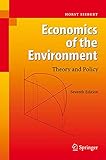Economics of the Environment : Theory and Policy / by Horst Siebert.
Tipo de material: TextoEditor: Berlin, Heidelberg : Springer Berlin Heidelberg, 2008Edición: 7Descripción: recurso en líneaTipo de contenido:
TextoEditor: Berlin, Heidelberg : Springer Berlin Heidelberg, 2008Edición: 7Descripción: recurso en líneaTipo de contenido: - texto
- computadora
- recurso en línea
- 9783540737070
- HC79.E5
Springer eBooks
The Problem -- Using the Environment – An Allocation Problem -- Static Allocation Aspect -- Production Theory and Transformation Space -- Optimal Environmental Use -- Environmental Quality as a Public Good -- Property-Rights Approach to the Environmental Problem -- Environmental-Policy Instruments -- Incidence of an Emission Tax -- Policy Instruments -- Policy Instruments and the Casuistics of Pollution -- The Political Economy of Environmental Scarcity -- Environmental Allocation in Space -- Environmental Endowment, Competitiveness and Trade -- Transfrontier Pollution -- Global Environmental Media -- Regional Aspects of Environmental Allocation -- Environmental Allocation in Time and Under Uncertainty -- Long-Term Aspects of Environmental Quality -- Economic Growth, Sustainability, and Environmental Quality -- Risk and Environmental Allocation.
The book interprets nature and the environment as a scarce resource. It offers a theoretical study of the allocation problem and describes different policy approaches to the environmental problem. The entire spectrum of the allocation issue is studied: the use of the environment in a static context, international and trade aspects of environmental allocation, regional dimensions, global environmental media, environmental use over time and under uncertainty. The book incorporates a variety of economic approaches, including neoclassical analysis, the public-goods approach, benefit-cost analysis, property-rights ideas, economic policy and public-finance reasoning, international trade theory, regional science, optimization theory, and risk analysis. The different aspectsof environmental allocation are studied in the context of a single model that is used through the book.
Para consulta fuera de la UANL se requiere clave de acceso remoto.


